Dental implants are an effective method of replacing missing teeth, providing the optimal solution for people with dental problems such as missing teeth or severely damaged teeth. My Auris Dental Clinic, with a team of experienced doctors and modern equipment, is proud to be a reputable address, providing high quality dental implant services. To help you better understand this technique, the article below will provide complete information about popular dental implant techniques, procedures, materials used, costs, care and answers to frequently asked questions.
Popular dental implant techniques variable
Dental implant technique is a method of restoring missing teeth with high efficiency and good aesthetics, there are three common types: unit implant, full jaw implant and mini implant. Unit implants are suitable for people missing a few teeth, bringing naturalness and sustainability. Full jaw implants replace all missing teeth, completely restoring chewing function, but require high technology and high cost. Mini implants, with a minimally invasive process, are suitable for weak or thin jawbones, but are not as durable as regular implants. Each technique has a specific process from consultation, implant, to crown installation.
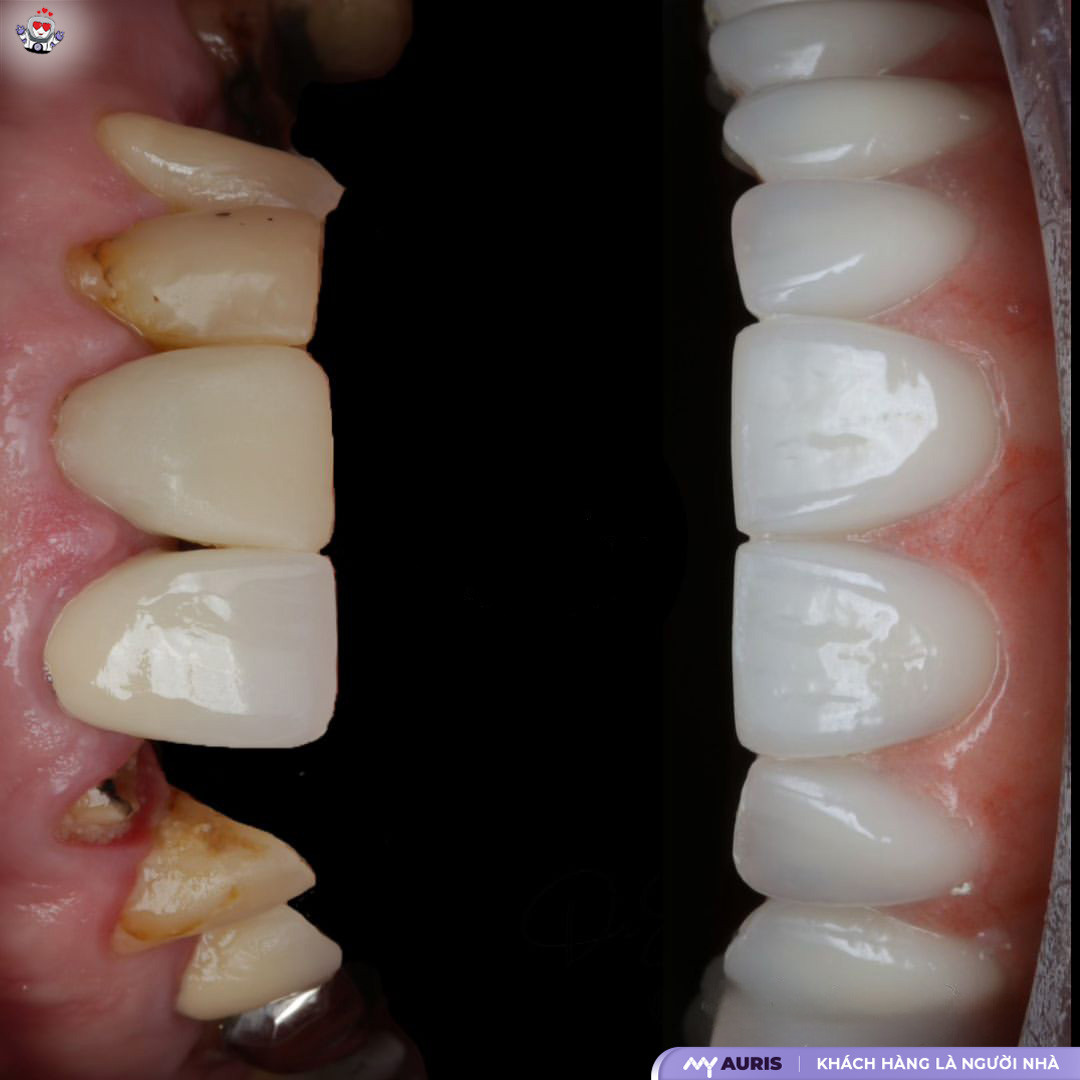
Unit implant
Unit implant is a technique An implant replaces a lost tooth. This technique is suitable for cases where one or several teeth are lost, the jaw bone is strong enough for implantation.
| Advantages | Disadvantages |
|---|---|
| Restores chewing function effectively, equivalent to real teeth. | Higher cost than other restoration methods. |
| Minimum conservation multiple real teeth around, does not affect other teeth. | Longer procedure time, requires many surgical steps. |
| Enhances the aesthetics of the smile, bringing a natural look. | Not suitable for cases of weak jawbone, missing many teeth. |
| High durability, can be used long term. |
Unit implant procedure:
- Examination and consultation: The dentist will examine and evaluate the patient’s oral condition, jaw bone condition, and overall health to come up with a suitable treatment plan.
- Take jaw impressions and design dental crowns: The doctor will take an impression of the jaw and design a tooth crown that matches the color, shape of real teeth.
- Implant: The doctor will perform implant placement at the lost tooth position, ensuring the implant is firmly fixed in the jawbone.
- Tooth crown installation: After the implant integrates into the jawbone, the doctor will install it. dental crown on implant.
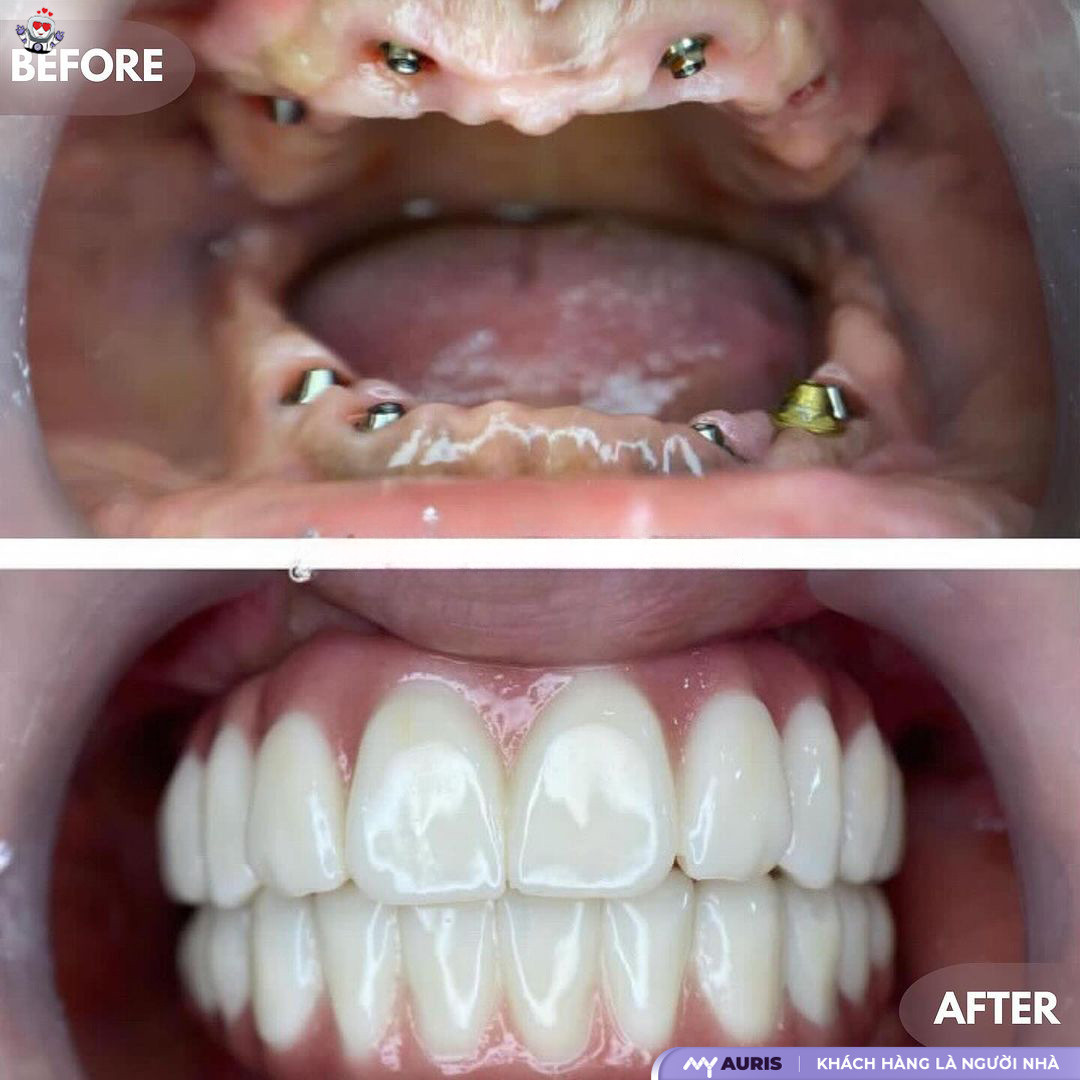
Full jaw implant
Full jaw implant is an implant technique that replaces all missing teeth. This technique is suitable for cases where all teeth are lost, the jaw bone is strong enough for implants.
| Advantages | Disadvantages |
|---|---|
| Restores chewing function completely, helping patients eat and drink easily and comfortably. | Higher cost than other restorative methods other. |
| Improves smile aesthetics, bringing a natural, youthful look. | Longer procedure time, requires many surgical steps. |
| High durability, can be used for a long time. | High technical requirements, needs a skilled doctor. |
| Minimizes jaw bone loss, helps preserve structure jaw bone structure. |
Full jaw implant procedure:
- Examination and consultation: The dentist will examine and evaluate the patient’s oral condition, jawbone condition, and overall health to come up with a suitable treatment plan. appropriate.
- Taking jaw impressions and designing dental crowns: The doctor will take jaw impressions and design dental crowns that match the color and shape of real teeth.
- Implant placement: The doctor will perform implant placement at the lost tooth position, ensuring the implant is firmly fixed. secured in the jawbone.
- Installing the dental crown: After the implant integrates into the jawbone, the doctor will proceed to install the dental crown on the implant.
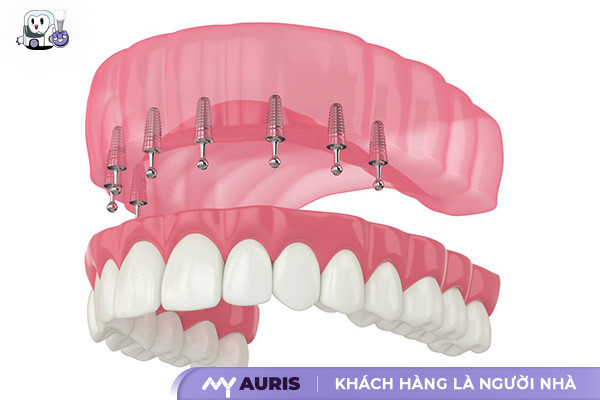
Mini Implant
Mini implant is a technique of placing implants that are smaller in size than conventional implants, suitable for bone cases.thin, weak jaw or missing teeth in the upper jaw.
| Advantages | Disadvantages |
|---|---|
| Simple implant procedure, less invasive, less painful. | Lower durability than conventional implants. |
| Quick recovery time, patients can eat and chew soon more. | Not suitable for cases of missing teeth in the lower jaw, thick jawbone. |
| Lower cost than regular implants. | Not suitable for cases where you want to restore front teeth, large chewing teeth. |
Mini implant procedure:
- Examination and consultation Consultation: The dentist will examine and evaluate the patient’s oral condition, jawbone condition, and overall health to come up with an appropriate treatment plan.
- Taking impressions of the jaw and designing a crown: The doctor will take an impression of the jaw and design a crown to match the color and shape of the tooth real.
- Implant: The doctor will perform a mini implant in the lost tooth position, ensuring the implant is firmly fixed in the jaw bone.
- Installing the dental crown: After the implant integrates into the jaw bone, the doctor will install the dental crown. implant.
Dental implant process
The dental implant process includes steps of examination, consultation, jaw impression, implant placement and crown installation. First, the doctor will do a general examination of oral health, evaluate the condition of the jawbone and determine the appropriate treatment method. Next, jaw impressions will be taken to make denture crowns using CAD/CAM technology. During the implant step, the implant post is placed into the lower jaw bone under local anesthesia. After 3-6 months when the abutment integrates with the bone, the crown will be installed on the abutment, completing the process.

Examination and consultation
Examination and consultation are the first important steps in the dental implant process. The dentist will conduct a general examination of your oral health, including:
- Examine the condition of the jawbone: Evaluate whether the condition of the jawbone is strong enough to receive an implant.
- Check dental condition: Determine the location of tooth loss, condition of remaining teeth, gingivitis, dental disease.
- Taking jaw impressions: The doctor will take jaw impressionsm to create a template for dental implants.
- X-ray: Helps doctors accurately assess jaw bone condition and appropriate implant location.
- Consulting on implant methods: The doctor will advise on the type of implant suitable for your specific condition, implant method, treatment time, cost…
Taking jaw impressions and design dental crown
After examination and consultation, the doctor will take an impression of the jaw to create a model for the dental implant. Jaw impressions are an exact copy of your teeth, helping the doctor design a denture crown that matches the jaw structure and natural tooth color.
The doctor will use modern CAD/CAM technology to design the denture crown. Dental crowns are made from high-quality materials such as porcelain and Zirconia, ensuring high aesthetics and durability.
Implantation
Implantation is the most important step in the dental implantation process. implant. The doctor will implant the implant into the jawbone, creating a solid foundation for the dentures.
- Local anesthesia: The doctor will perform local anesthesia, helping you not feel pain during the implantation process.
- Creating implant holes: The doctor will use specialized tools to create implant holes suitable for the implant post.
- Implantation: The doctor will insert the implant into the implant hole created.
- Suturing the wound: After implantation, the doctor will stitch the wound, helping the wound heal quickly.
Installing the crown
After the implant has integrated with the jawbone (usually 3-6 months), the doctor will install the crown.
- Taking an impression of the jaw: The doctor will take an impression of the jaw to create a mold for the crown.
- Fabrication of dental crowns: The doctor will use CAD/CAM technology to manufacture denture crowns that match the mold and color of natural teeth.
- Installing the crown: The doctor will attach the crown to the implant, completing the dental implant process.
Implant material
Implant material plays an important role in ensuring the effectiveness and durability of dentures when using dental implants. Titanium is the most popular material thanks to its high biocompatibility, durability and affordable price, but has limitations.color and effective with weak jaw bones. Zirconium, a more aesthetic option with a bright white color and high durability, is expensive and technically complex. Gold, although luxurious and durable, is very expensive and difficult to manipulate.

Titanium
Titanium is the most commonly used material in dentistry, especially for dental implants. The reason is because Titanium possesses outstanding advantages:
- High biocompatibility: Titanium is proven to be safe, does not cause irritation or rejection in the human body, and helps integrate well with the jaw bone.
- High durability: Titanium is a hard, durable material with high corrosion resistance, ensuring long-term durability for dental implants.
- Affordable price: Compared to other materials, Titanium has a lower price, suitable for many customers.
However, Titanium also has some limitations:
- Color: Titanium is gray, cannot be colored like real teeth, and may affect the aesthetics for people with high aesthetic needs.
- Low effectiveness with weak jawbones: Titanium may not be suitable for cases with weak or thin jawbones, requiring mini implants or using jaw augmentation methods.
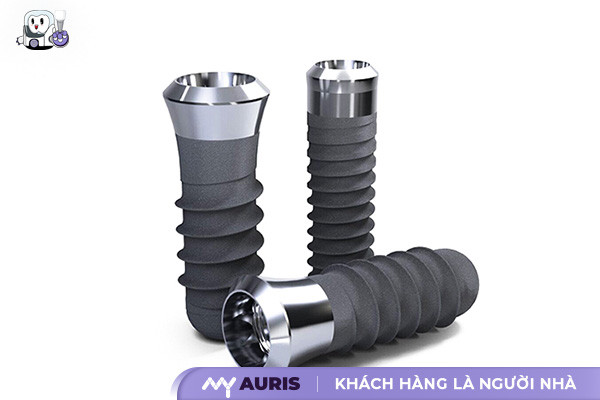
Zirconium
Zirconium is a new material appearing in the dental industry, highly appreciated for its aesthetics and durability.
- Aesthetics: Zirconium has a bright white color, similar to the color of real teeth, creating a high aesthetic effect for dental implants.
- Durability cao: Zirconium has high durability, corrosion resistance and good strength, ensuring long-term durability for dental implants.
- Does not cause irritation: Zirconium is highly biocompatible, safe for the body, does not cause irritation or rejection.
However, Zirconium also has some disadvantages:
- High cost: Zirconium has a higher cost than Titanium, so it is not suitable for those with a limited budget.
- Technical complexity: Zirconium manufacturing techniques are more complex than Titanium, requiring high technique from doctors.
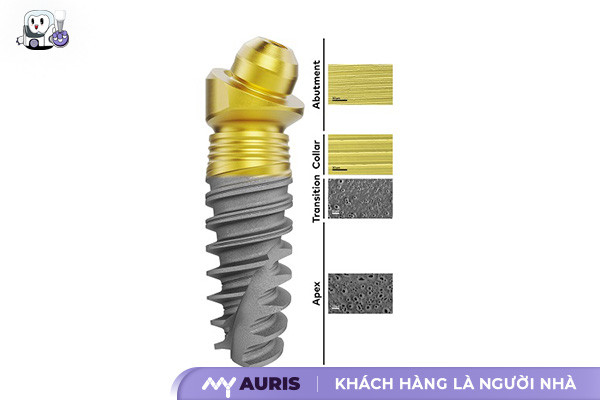
Gold
Gold is considered a high-end and luxurious implant material, used for people with high demands for aesthetics and durability.
- Aesthetics: Gold has a beautiful bright yellow color, creating a high aesthetic effect for dental implants, bringing a natural, luxurious beauty.
- High durability: Gold is a very durable material, resistant to corrosion and good strength, ensuring long-term durability for dental implants.
- Does not cause irritation: Gold is highly biocompatible, safe for the body, does not cause irritation or rejection.
However, Gold also has disadvantages:
- Very high price: Gold is the material with the highest price among the three types of implant materials, only suitable for people with good economic conditions.
- Difficult to manipulate: Gold is a hard and difficult material to manipulate, requiring high technique from the doctor.
Cost of dental implant
The cost of dental implant depends on depends on many factors such as type of dental implant, implant technique, implant location and doctor’s skills. There are different types of dental implants in price, from 5 million VND for mini dental implants, to 150-300 million VND for full jaw teeth. In addition, costs are also affected by dental facilities. To easily access this service, many clinics offer financial assistance such as installment payments, promotions and loan support.
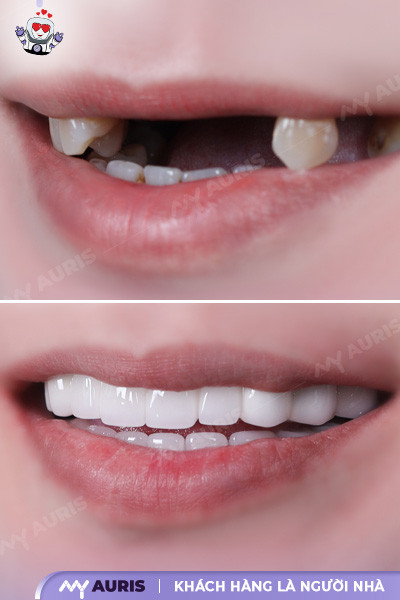
Factors affecting costs
The cost of dental implants depends on many factors, including:
- Type of dental implant: On the market today there are many types of dental implants with different materials, technologies and origins, leading to differences in price.
- Implant technique: Dental implant technique also directly affects the cost. For example, mini implant techniques often cost less than traditional implant techniques.
- Implant location: Implant location affects the complexity of the surgical procedure. Difficult implant locations that require high technology will have a higher cost.
- Doctor’s skill: The dentist’s skill plays an important role in the success of surgery and aesthetic results. Experienced, highly skilled doctors often have higher fees.
- Dental: Each dental clinic has a separate price depending on the equipment, facilities and services included.
Compare costs between types of teeth implant
Below is a table comparing the costs of some popular types of dental implants:
| Type of dental implant | Cost (million VND) | Advantages Points | Disadvantages |
| Unit dental implant | 12 – 50 | – Effective chewing function recovery result | – Higher cost |
| Full dental implant | 150 – 300 | – Complete restoration of missing teeth | – Highest cost |
| Mini dental implant | 5 – 10 | – Simple, minimally invasive technique | – Low effectiveness, not suitable for all cases |
Note: The above price list is for reference only. Actual costs may vary depending on each specific case.
Financial support
To help patients access dental implant services, many dentists now offer financial support programs like:
- Install payments: Pay costs by term in accordance with your financial ability.
- Discounts: Promotions and incentives for customers.
- Loan support: Loan support from banks with preferential interest rates.
Advice: Before deciding on dental implants, you should consult a dentist for advice and choose the appropriate method. in accordance with your health status, financial ability and desires.
Dental implant care
Proper dental implant care is an important factor in maintaining oral health and implant durability. Every day, you need to brush your teeth twice with a soft toothbrush and fluoride toothpaste, combined with dental floss and antibacterial mouthwash to remove bacteria. Regular dental checkups every 6 months help detect early problems such as gingivitis or jaw bone loss, while also cleaning plaque. If you experience swelling, pain or the implant is loose, you need to see a doctor immediately.
Daily oral hygiene
After dental implant placement, daily oral hygiene becomes more important ever. Because implants are foreign objects implanted into the jawbone, they are susceptible to infection if not properly cared for.
Here are the daily oral hygiene steps for dental implants:
- Brush your teeth twice a day: Use a soft-bristled toothbrush, fluoride toothpaste, and proper brushing technique. You should brush gently, avoid brushing hard, causing damage to gums and implants.
- Using dental floss: Dental floss helps remove plaque and leftover food in between teeth, in places the brush cannot reach. You should floss after brushing your teeth, at least once a day.
- Use mouthwash: Antibacterial mouthwash helps remove remaining bacteria in the oral cavity, helping to protect dental implants and healthy gums. You should rinse your mouth twice a day, after brushing your teeth and before going to bed.
Note:
- You should choose toothbrushes, toothpaste, dental floss and mouthwash that are suitable for dental implants.
- Do not use products with strong bleaching properties or containing alcohol, because they can harm the implant.
- Ask your dentist about the type of oral care product suitable for your health condition.
Regular check-ups
Regular check-ups are an effective way to detect implant problems early, helping to handle them promptly and avoid dangerous complications.
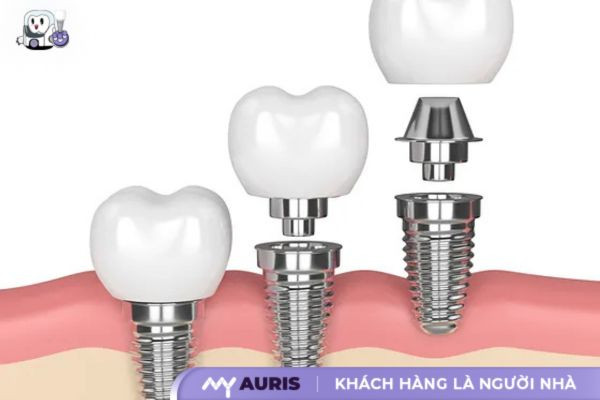
Visit a dentist every 6 months to:
- Treat implant problems if any.
Signs that require immediate medical attention:
- Pain sore, swollen gums around the implant.
- The implant is loose.
- The implant is discolored.
- Bad breath odor appears.
Treatment of related problems
During the use of implants, some problems may be encountered such as:
- Gingivitis:Gingivitis is a common condition after implant placement, due to bacteria accumulating around the implant. Symptoms: Red, swollen gums, bleeding when brushing teeth, bad breath.
- Jaw bone loss: Jaw bone loss is a condition that occurs when the implant is not fully integrated into the jaw bone or due to poor oral hygiene. Symptoms: The implant is loose, the gums recede, and the gums around the implant are concave.
- Peri-implantitis: Peri-implantitis is a suspected inflammatory conditionSevere damage around the implant can cause damage to the jawbone and even loss of the implant. Symptoms: Severe pain, swollen gums, pus discharge, receding gums, loose implants.
See a dentist immediately if there are any unusual signs!
The dentist will rely on your condition to come up with a suitable treatment regimen to help you overcome the problem, protect your implant’s health and your radiant smile.
Frequently asked questions about dental implants
Dental implants are a restoration method. Modern missing teeth bring many aesthetic and health benefits. The implantation process is not too painful as anesthetics are used, and patients may experience mild discomfort for the first few days, but this is controlled with painkillers. The average recovery time lasts from 3-6 months, depending on the implant location, number of implants and the patient’s health condition. This method does not cause adverse health effects and is highly durable if properly cared for. Dental implants also provide natural aesthetic results and can last a lifetime when using quality materials and applying modern implant techniques.
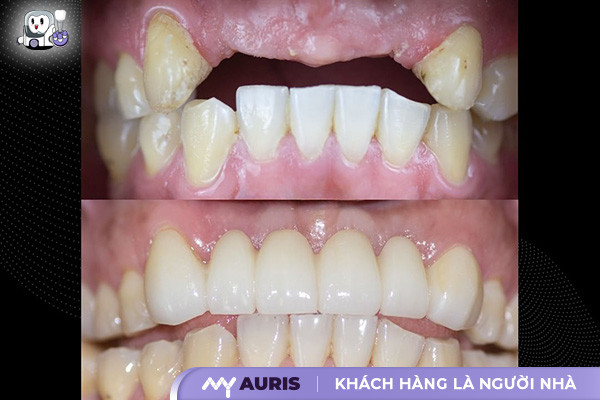
Is dental implant painful?
Is dental implant technique painful? pain is something that many people are concerned about. Dental implants are adental surgery, and like all surgeries, there will be slight pain. However, you absolutely do not need to worry because the doctor will use local anesthetic to effectively reduce pain.
After the anesthetic wears off, you may feel slight pain and discomfort for the first few days. The doctor will prescribe painkillers for you to use during this time.
Furthermore, the painless dental implant technique is increasingly popular, helping to minimize pain for patients. This technique combined with modern equipment helps the implant process take place quickly, accurately and minimize invasiveness.
How long is the recovery time after dental implants?
Recovery time after dental implant placement depends on many factors, including:
- Implant location: Implantation in the upper or lower jaw, in the incisor or molar area will affect recovery time.
- Number of implants: Implantation of one or more implants will also affect recovery time.
Normally, recovery time after dental implant placement takes about 3-6 months. During this time, you need to follow the instructions Doctor’s instructions to ensure the healing process goes smoothly.
Does dental implants affect health?
Dental implants is a safe technique that does not affect health. However, implant placement still needs to be performed by a dentist with expertise and experience and using standard medical equipment.
Before implantation, you should inform the doctor about your health condition, especially chronic diseases, drug allergies, are using medication to treat the disease, etc. so that the doctor can come up with a suitable treatment plan.
Are dental implants durable?
Dental implants are durable? High, considered a long-term dental restoration solution. The durability of dental implants depends on many factors, including:
- Implant material: Commonly used implant materials are titanium or zirconium, both of which have high durability and good compatibility with body.
- Implantation technique: Precise, professional implantation technique will help increase the durability of dental implants.
- Dental care: Proper oral hygiene after implant placement will help protect the implant and prolong the life of the dental implant.
With proper oral care, dental implant can be used throughout life.
Dental implantsAre dental implants beautiful?
Dental implants bring highly aesthetic results, helping you have a confident, radiant smile.
- Dental implants are made from ceramic or zirconia materials, have the same color and shape as real teeth, helping you have a natural smile.
- Dental implants are implanted directly into the jawbone, helping to firmly fix the teeth, not shaking, creating a comfortable feeling when chewing.
- Dental implants can be designed as required, helping you have a perfect smile, suitable for your face.
Dental implants are the optimal tooth restoration solution, bringing a confident smile and strong teeth. However, to choose the appropriate dental implant technique and achieve optimal results, you need to go to My Auris Dental – where a team of experienced doctors, modern equipment, and advanced dental implant methods converge. You can contact My Auris Dental for advice and choose the most suitable dental implant solution.
Thu Lieu






